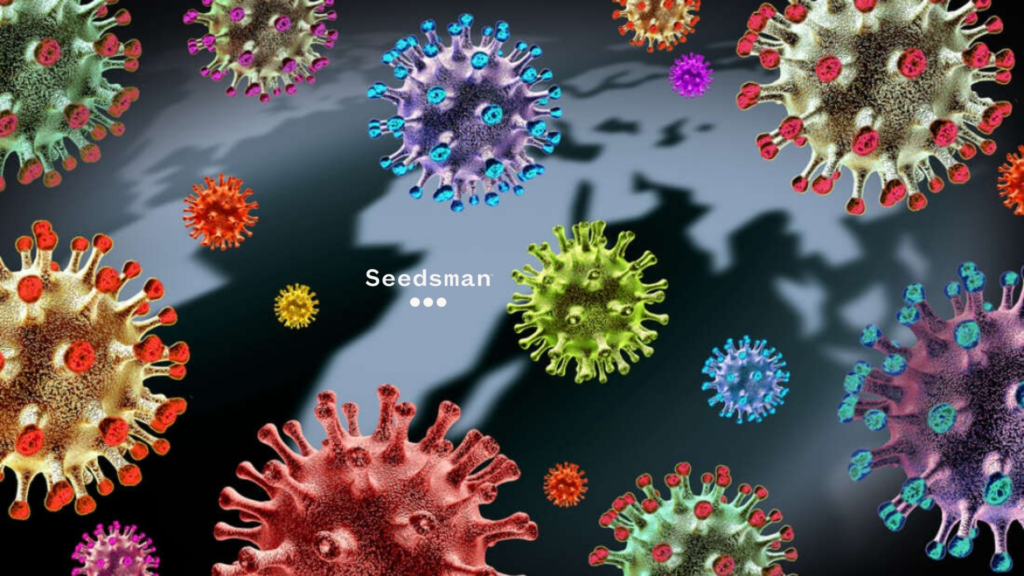
Cannabinoids Stop COVID-19 From Infecting Cells, Study Finds
Two non-psychoactive cannabinoids found in most cannabis strains have the potential to ward off COVID-19, according to a new study in the Journal of Natural Products[i].
The fact that the research was carried out in a petri dish rather than in live patients means it’s too early to say whether smoking weed or consuming edibles will actually protect against the virus. However, results do at least suggest that these compounds may have a role to play in the development of new treatments for coronavirus.
How Cannabinoids Fight COVID-19
In a nutshell, the study authors found that two cannabinoids in hemp appear to bind to the spike protein on the surface of the COVID-19 virus, thus preventing it from being able to enter cells. Under normal conditions, this spike protein acts like a kind of hook that latches onto an enzyme in cell membranes called ACE2, triggering a cascade of effects that ultimately results in cells becoming infected with the virus.
However, using a technique called affinity selection mass spectrometry, researchers from Oregon State’s Global Hemp Innovation Centre found that cannabigerolic acid (CBGA) and cannabidiolic acid (CBDA) – the precursors to cannabigerol (CBD) and cannabidiol (CBD) – have a natural binding affinity for this spike protein. This led them to suspect that these cannabinoids may be able to inhibit COVID-19.
To test their theory, the study authors introduced SARS-CoV-2 – the virus that causes COVID-19 – to human endothelial cells in a petri dish. When they added CBDA and CBGA, they noted that the virus became unable to enter and infect these cells.
Can Cannabinoids Actually Treat COVID-19
Highlighting the importance of this finding, study author Richard van Breemen explained that “any part of the infection and replication cycle is a potential target for antiviral intervention, and the connection of the spike protein’s receptor-binding domain to the human cell surface receptor ACE2 is a critical step in that cycle.”
“That means cell entry inhibitors, like the acids from hemp, could be used to prevent SARS-CoV-2 infection and also to shorten infections by preventing virus particles from infecting human cells. They bind to the spike proteins, so those proteins can’t bind to the ACE2 enzyme, which is abundant on the outer membrane of endothelial cells in the lungs and other organs.”
The researchers used both the Alpha and Beta variants of COVID-19 for their study and found that the cannabinoids were effective against both of these. While they haven’t yet tested for Delta and Omicron, they are hopeful that these newer variants will be equally susceptible to the impact of CBGA and CBDA.
“Our data show CBDA and CBGA are effective against the two variants we looked at, and we hope that trend will extend to other existing and future variants,” said van Breemen.
While this is obviously great news, it’s important to stress once again that there’s no evidence to suggest that consuming cannabis or cannabinoids actually helps to treat COVID-19. However, given that CBGA and CBDA have a long history of safe use by human patients, a major clinical trial into the efficacy of these compounds at fending off the virus now seems a logical next step.
Stay tuned. And keep washing those hands!
[i] van Breemen RB, Muchiri RN, Bates TA, Weinstein JB, Leier HC, Farley S, Tafesse FG. Cannabinoids Block Cellular Entry of SARS-CoV-2 and the Emerging Variants. Journal of natural products. 2022 Jan 10. – https://pubs.acs.org/doi/10.1021/acs.jnatprod.1c00946
Cultivation information, and media is given for those of our clients who live in countries where cannabis cultivation is decriminalised or legal, or to those that operate within a licensed model. We encourage all readers to be aware of their local laws and to ensure they do not break them.
Source link












